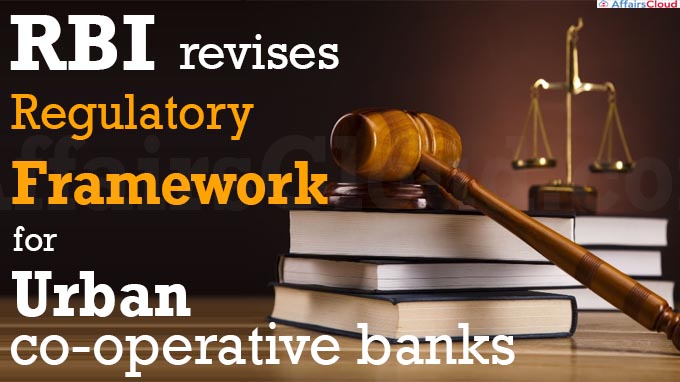
What are the Revisions?
RBI has adopted the following four-tiered regulatory framework from the existing two-tiered framework, for categorization of UCBs in order to strengthen the financial soundness of the UCBs.
i.Tier 1 – All unit UCBs and salary earners’ UCBs (irrespective of deposit size), and all other UCBs having deposits up to Rs 100 crore
ii.Tier 2– UCBs with deposits more than Rs 100 crore and up to Rs 1000 crore
iii.Tier 3 – UCBs with deposits more than Rs 1000 crore and up to Rs 10,000 crore
iv.Tier 4 – UCBs with deposits more than Rs 10,000 crore
Minimum Net Worth for UCBs
i.RBI prescribed a minimum net worth of Rs 2 crore for Tier-1 UCBs operating in single districts, and Rs 5 crore for all other UCBs.
ii.UCBs, which currently do not meet the minimum net worth requirement, can achieve the minimum net worth of Rs 2 crore or Rs 5 crore in a phased manner.
- Such UCBs will have to achieve at least 50% of the applicable minimum net worth on or before March 31, 2026, and the entire stipulated minimum net worth on or before March 31, 2028.
iii.If a UCB wants to switch to a higher Tier on account of increase in deposits in any year, it will be provided a glide path of upto a maximum of three years, to comply with higher regulatory requirements.
Minimum CRAR Requirement
i.Tier-1 UCBs will continue to maintain a minimum CRAR (Capital to Risk Weighted Assets) of 9% on an ongoing basis.
ii.Tier- 2,3,4 UCBs will maintain a minimum CRAR of 12% on an ongoing basis.
iii.UCBs in Tier-2,3,4, which do not currently meet the revised CRAR of 12% can achieve the same in a phased manner.
- Such UCBs will have to achieve the CRAR of at least 10% by March 31, 2024, 11% by March 31, 2025, and 12% by March 31, 2026.
Other Key Revisions:
i.An automatic route will be introduced for branch expansion of the UCBs which meet the revised Financially Sound and Well Managed (FSWM) criteria, and permit them to open new branches up to 10% of the number of branches as at the end of the previous financial year.
ii.To examine the issues concerning recommendation for capital augmentation under the provisions of Section 12 of the Banking Regulation Act, 1949 (as amended) (as applicable to co-operative societies), a Working Group comprising the representatives from RBI, SEBI (Securities and Exchange Board of India) and Ministry of Co-operation, Government of India has been constituted.
RBI permits overseas Indian banks to deal in Financial Products not permitted in domestic markets
RBI also eases rules for foreign branches or subsidiaries of banks or All India Financial Institutions (AIFIs) to deal in financial products that are not permitted in India w.e.f. December 1, 2022.
- This permit is applicable to all banks regulated by the RBI (excluding co-operative banks, Regional Rural Banks and Local Area Banks), and AIFIs operating in foreign jurisdictions and in International Financial Services Centers (IFSCs) in India including Gujarat International Finance Tec-City (GIFT City).
However, this permit of dealing in such products carries some conditions which need to be adhered by the entities. These include the following:
i.It should be done with the prior approval from their Board and, if required, the appropriate authority in the concerned jurisdictions.
ii.These entities must have adequate knowledge, understanding, and risk management capability for handling such products and
iii.Their exposure and mark-to-market (MTM) on these products should be appropriately reported in the returns furnished to the RBI.
iv.They should provide information about dealing in such financial products in the manner and format and within the time frame as prescribed by the RBI.
v.They should not deal in products linked to Indian Rupee unless specifically permitted by RBI and do not accept structured deposits from any Indian resident.
RBI, Financial Services Agency of Japan exchange Letters of Cooperation
A letters of cooperation was exchanged between the RBI and Financial Services Agency (FSA), Japan in the field of Central Counter Parties (CCPs) to improve mutual cooperation.
- Under this both entities agreed to hold a dialogue or exchange views about matters of common interest.
- Both sides will enhance cooperation in line with their respective laws and regulations.
Recent Related News:
i.On 18th October 2022 Reserve Bank of India (RBI) provided in-principle approval to Cygnet Infotech Private Limited, a fintech firm to operate as a non-banking financial company (NBFC) account aggregator.
ii.RBI decided to allow foreign inward remittances received under the Rupee Drawing Arrangement (RDA), to be transferred to the KYC (Know Your Customer) compliant bank account of the biller (beneficiary) through Bharat Bill Payment System (BBPS), subject to the conditions.
About Reserve Bank of India (RBI):
Governor– Shaktikanta Das
Deputy Governors– Mahesh Kumar Jain, Michael Debabrata Patra, M. Rajeshwar Rao, T. Rabi Sankar
Headquarters– Mumbai, Maharashtra
Establishment– 1st April 1935